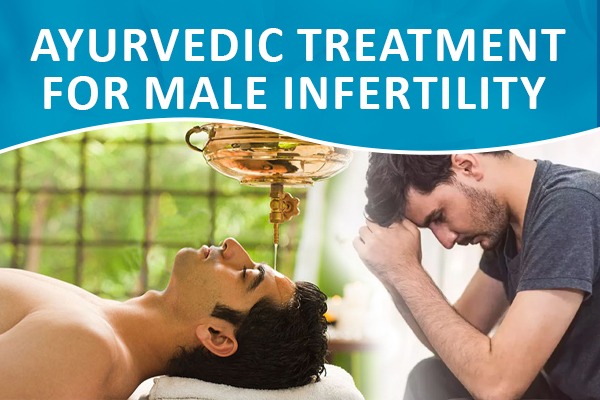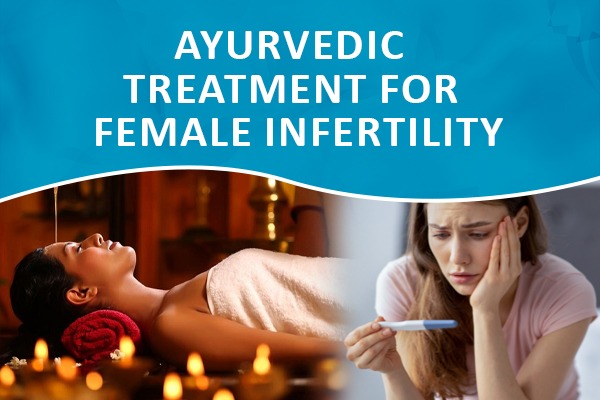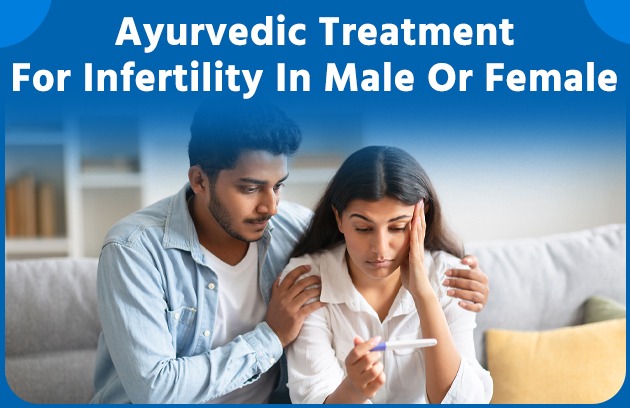Ayurvedic Treatment For Infertility In Male Or Female
According to Ayurveda, infertility occurs when a person’s biological capacity to contribute to conception is impaired for various reasons. The inability to maintain a pregnancy to term is another way of describing infertility in women.
Stress, unhealthy eating habits, lack of physical activity, and environmental contaminants are all potential causes of infertility, which affects men and women equally. To address infertility from every angle and speed up the conception process, it is prudent to draw on the traditional knowledge that our Aasha Ayurveda provides. In this article, we will talk about the causes and Ayurvedic treatment for infertility of males and females.
Male Infertility
Some environmental factors, health and lifestyle choices, and abnormal sperm production or function are among the many causes of male infertility. Thousands of years ago, Aasha Ayurveda identified male infertility and outlined therapies and treatments to alleviate it. To aid in conception, we at Aasha Ayurveda adhere to these time-honored practices, which include a balanced diet and other lifestyle adjustments.
Reasons Why Men Fail to Conceive
According to our Aasha Ayurveda, these are the reasons men cannot conceive.
Congenital Abnormalities or Bijaupa Tapa:
Reproductive system structural and developmental disorders can result from specific gamete abnormalities.
Klaibya or Male Sexual Dysfunctions:
Old age, Shukra exhaustion, mental worries, crippling diseases like diabetes mellitus, overstressing the body, and excessive indulgence in sex are some of the factors that can cause klaibya.
Curing Male Infertility with Ayurvedic Methods
Ashtanga Ayurveda has eight main branches, one of which is Vajikarana, which focuses on a person’s sexual health. The Aasha ayurvedic approach to ayurvedic treatment for male infertility consists of –

Panchakarma Therapy:
Panchakarma is one of the most esteemed Ayurvedic treatments for infertility; it restores harmony to the body’s doshas and promotes health in general. When men experience infertility, a Panchakarma practitioner may prescribe Basti and Shodhana, two of the therapeutic procedures.
Yogasana:
Padmasana (lotus pose), Bhujangasana (cobra pose), Sarvangasana (shoulder stand), Paschimottanasana (seated forward bend), and Parivrtta trikonasana (twisted triangle pose) are some of the yoga asanas that can help keep the mind, body, and spirit balanced and maybe even prevent infertility if practised regularly.
Herbal Remedies:
When it comes to treating male infertility, Aasha Ayurveda uses a variety of dravyas, or medicines, including:
- For better sperm quality, use milk, ghee, Shatavari, and Ashwagandha.
- Kushtha and sugarcane to clean the sperm
- To enhance the ability to fertilise, herbs such as Brahmi, Shatavari, and Guduchi
- Enhance your libido with Kesar, garlic, long pepper, lavanga, and other herbs.
- To delay or stop ejaculation in its tracks, try nutmeg, ashwagandha, or chandana dravyas.
If you want to keep your body and libido in good shape, the Aasha Ayurveda says to eat a diet full of fresh produce and lean meats regularly. You can also eat dry fruits such as walnuts, figs, dates, and almonds daily.
Healthy Eating Plan:
Exploring the Issue of Female Infertility
Many factors, including hormonal imbalances, physical health issues, lifestyle choices, and environmental influences, contribute to infertility in women. Infertility in women can have structural causes, such as uterine fibroids, a blocked fallopian tube, or a cervical canal defect.
As explained in Aasha Ayurveda, the state of the Shukra dhatu, or reproductive tissues, determines the reproductive health of both men and women. Because of its involvement in ovum production, Shukra dhatu is vulnerable to obstruction by factors such as an unhealthy diet, mental or physical illness, poor digestion, and so on. You should check the best ayurvedic treatment for fertility.
According to Aasha Ayurveda, three doshas—Sadhaka Pitta, Prana Vata, and Apana Vata—are important in female reproductive health. To cure infertility in women, Ayurvedic medicine focuses on restoring internal harmony by balancing the body’s doshas.
Ayurvedic Treatment for Infertility in Women
To help women conceive more easily and treat infertility, some turn to ayurvedic treatment for female infertility like:

Fertility Massage:
In addition to rehydrating the uterine tissues and blood, this massage will increase the flow of oxygenated blood to the eggs. Additionally, it removes any blockage that may have been there in the fallopian tubes’ way.
A Balanced Diet:
To avoid hormonal imbalance, eating organic, pesticide-free foods whenever possible is best. Folate aids in cell division and helps avoid birth abnormalities, so it’s smart to eat foods high in it. Milk, nuts, ghee, dates, saffron, beans, peas, honey, and spices like cumin and turmeric are all essential parts of the diet.
Workouts for Hormone Stabilisation:
Regular exercise maintains hormonal balance and a healthy body. It improves the odds of getting pregnant as well.
Yoga poses:
Not only does yoga help with fertility problems, but it also reduces stress. Some of the yoga poses that are good for women’s reproductive health include Bhramari Pranayam, like bee breath; Viparita Karani, like legs up the wall pose; and Hastapadasana, which is like standing forward bend. Since a lack of nourishment to the reproductive tissue, or Shukra dhatu, is a leading cause of infertility in women, our Aasha ayurvedic treatments for ovulation centre on redistributing nutrients from food to nourish the Shukra dhatu.
Swedanam:
The purpose of swedanam is to facilitate perspiration and, by extension, eliminate harmful substances. Exercising while covered in heavy blankets is part of the procedure to make you sweat.
Vamanam:
Although vomiting up undigested food is an unpleasant exercise, it is necessary. Because of this, Vamanam therapy is crucial for detoxification.
Ghritam Phala:
The Ayurvedic medicine for female infertility is a mixture of liquefied butter and milk that the patient consumes.
Gokshura:
For women struggling with infertility, the Gokshura herb has a reputation for ovarian stimulation. Additionally, it is effective for women with Polycystic Ovary Syndrome who do not ovulate. Ayurvedic medicine also uses the following herbs—Shatavari, Shatpushpa, Laxmana, Ashoka, Dashmool, Lashun, and Lodhra—to promote fertility and healthy reproductive organ function.
Shirodhara:
Shirodhara is a method of treating hormonal imbalances in women using the application of medicated oils. By pouring the oil at a precise spot on the forehead in a rhythmic pattern, the therapist can help the patient achieve mental equilibrium. Basti is another therapeutic method that makes use of medicinal oils. It enhances the ovum’s quality and eliminates all the doshas in the rectum.
Conclusion
To help women who are unable to conceive, we provide carefully planned programmes that enhance the reproductive system’s environment and the quality of the ovum, allowing for successful fertilisation and implantation. To help men experience better sperm quality and mobility, our programmes also provide Ayurvedic treatment for male infertility. Our natural treatment for infertility will help you.


